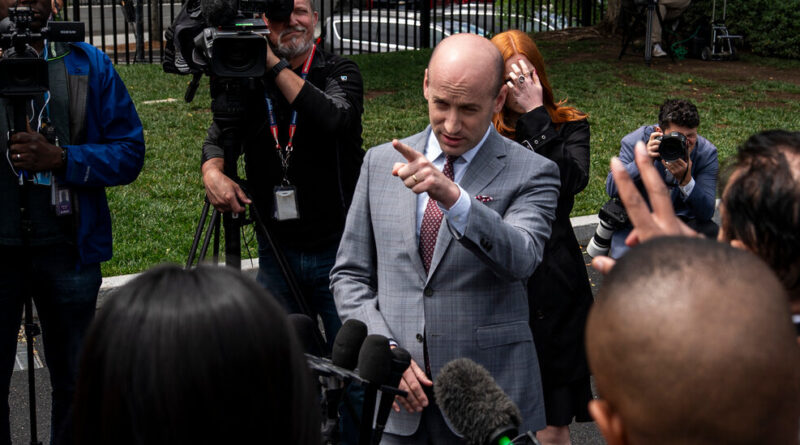Trump Officials Consider Suspending Habeas Corpus for Detained Migrants
Stephen Miller, the White House deputy chief of staff who orchestrated President Trump’s crackdown on immigration, said on Friday that the administration was considering suspending immigrants’ right to challenge their detention in court before being deported.
“The Constitution is clear,” he told reporters outside the White House, arguing that the right, known as a writ of habeas corpus, “could be suspended in time of invasion.”
“That’s an option we’re actively looking at,” he said, adding, “A lot of it depends on whether the courts do the right thing or not.”
Such a move would represent a dramatic escalation in the Trump administration’s battles with the courts over his efforts to carry out mass deportations. And it would be yet another sweeping assertion of executive authority, one in tension with a right generally guaranteed in the Constitution.
As with many of Mr. Trump’s assertions of power, it was unclear whether he could lawfully do it.
Article I of the Constitution says writs of habeas corpus are a privilege that “shall not be suspended, unless when in cases of rebellion or invasion the public safety may require it.” That direction “is almost universally understood to authorize only Congress to suspend habeas corpus,” said Stephen I. Vladeck, a law professor at Georgetown University.
“The only reason why they would do this is because they’re losing” in court, he added.
Habeas corpus has been suspended four times in the history of the United States, most recently in Hawaii after the attack on Pearl Harbor in 1941.
Each time, authorities cited specific congressional statutes to justify the move, with the exception of one president: Abraham Lincoln, who suspended habeas corpus during the Civil War, while Congress was not in session. His move was challenged, and in 1863, Congress passed a law giving him the explicit right to suspend habeas corpus for the duration of the hostilities.
Mr. Trump and his deputies have repeatedly tried to liken their crackdown on illegal immigration to a war or repelling an invasion. He has referred in speeches to waves of migrants entering the United States as invasions, and in March invoked the Alien Enemies Act — another wartime authority — to accelerate the deportations of Venezuelans accused of being members of the gang Tren de Aragua.
But deportations carried out under that law have been challenged in court, and the Supreme Court has blocked any further deportations under that law for now. In addition, three federal judges have in recent weeks issued rulings rejecting the argument that the wave of immigration constitutes an invasion, as Mr. Miller maintained.
Still, the administration has insisted that the courts cannot overrule the president’s decisions regarding how, where and when immigrants are deported.
Mr. Miller echoed that sentiment in his comments to reporters outside the White House on Friday, arguing that because Congress put the immigration courts under the executive branch, and not the judicial branch, Mr. Trump’s decisions could not be blocked by the courts.

